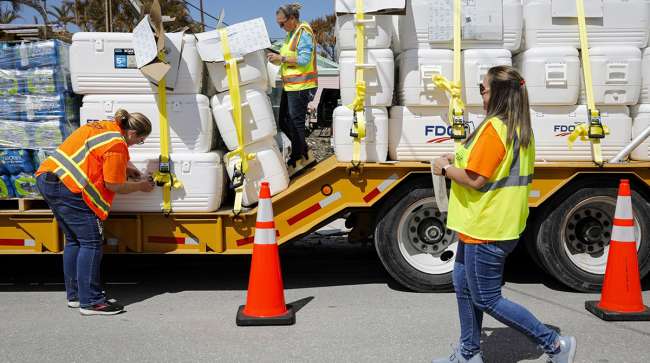Senior Reporter
FMCSA Rule Restricts Emergency HOS Waivers to 14 Days

[Stay on top of transportation news: Get TTNews in your inbox.]
A rule recently adopted by the Federal Motor Carrier Safety Administration cuts from 30 to 14 the maximum number of days a state may waive hours-of-service regulations during a state of emergency, a move that has drawn criticism from some stakeholders but which emerges as a compromise from the agency’s previous, more strict proposed five-day limit.
“This rule ensures that the relief granted through emergency declarations is appropriate and tailored to the specifics of the circumstances and emergencies being addressed,” FMCSA wrote in its Federal Register final rule announcement last month. The rule is set to take effect Dec. 12.
The agency also revised some of the operational guideposts when waivers are in effect.
“This rule also revises the process for extending automatic emergency regulatory relief where circumstances warrant and allows for potential reporting requirements when FMCSA issues an extension or modification,” it said.
The change comes even as the agency itself in its initial December proposal acknowledged that no specific “quantitative evidence” existed that 30-day emergency hours-of-service exemptions have led to a “degradation of safety.” However, the agency stressed that it is “generally accepted that driver fatigue increases risk of safety incidents, and that one of the leading causes of driver fatigue is driving for too long and working long hours without adequate opportunities for restorative sleep.”
This lack of specific evidence was a central aspect of why a wide variety of trade organizations including American Trucking Associations, the American Association for State Highway and Transportation Officials, the Florida Petroleum Marketers Association and the Owner-Operator Independent Drivers Association essentially dubbed the initial proposal as a solution looking for a problem. They were joined in opposition by the state of North Dakota.
“Essentially, our biggest concern with the proposal was that FMCSA was proposing a five-day initial duration,” said Dan Horvath, ATA’s senior vice president of regulatory affairs and safety policy. “In our estimate, based on the feedback we got not only from our motor carriers, but from state associations and from other safety groups as well, is that five days is just not going to be enough time. So we kind of split the difference with FMCSA, and said how about 14 days? That’s what they ended up with, so we were pleased with that aspect. We’re supportive of that.”
Horvath added, “I think overall this is a great example of how the comment process and public feedback can help change the way a rulemaking is.”
Despite the agency concessions, the Commercial Vehicle Safety Alliance still opposes the final rule.

Jetco Delivery hauls rescue supplies in the aftermath of a hurricane in Texas. (Jetco Delivery)
“After hearing concerns from many of our state jurisdiction members, CVSA is asking FMCSA to reconsider the duration of the automatic regulatory relief that takes effect upon a regional declaration of emergency by a governor, a governor’s authorized representative or FMCSA,” CVSA wrote in a Nov. 2 letter to FMCSA Administrator Robin Hutcheson. The group seeks broader autonomy for states.
In order to structure emergency relief that takes into account all types of disasters, CVSA reiterates the alliance’s recommendation that the agency consider eliminating any set duration and rather allow the issuing entity the authority to set the duration as they see fit to adequately address the length of the emergency,” CVSA’s letter said. CVSA did note, however, that the final rule limits the potential for misuse of emergency relief.
North Dakota Gov. Doug Burgum, a Republican, also has petitioned the federal government to reconsider the final rule, which he said is restricting governors’ ability to waive HOS regulations for commercial truck drivers, and that the change will hurt farmers, ranchers and fuel distributors, and make it harder to meet the needs of citizens during weather-related emergencies.
“In North Dakota, the ability to waive hours of service quickly during an emergency without having to slog through a sea of bureaucratic red tape can literally mean the difference between life and death or the loss of someone’s livelihood,” Burgum said in a Nov. 9 statement. “While we appreciate that FMCSA abandoned its five-day proposal, the 14-day waiver period is still too short, and we urge FMCSA to restore the 30-day waiver authority.”
Want more news? Listen to today's daily briefing below or go here for more info:




